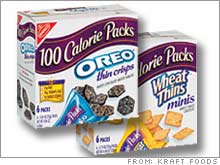|
What's for dinner in 2006
Experts say the next wave of food fads will cater to our continued quest for better health.
NEW YORK (CNNMoney.com) - Now that the Atkins diet craze is dead -- the low-carb craze creator Atkins Nutritionals filed for bankruptcy in 2005 -- what'll be the next fad for food companies to jump on? "Over the next few years, I think consumers' focus will be on maintaining a healthy balance of carbs and calories, as opposed to extreme food choices," said Lynn Dornblaser, analyst with market research firm Mintel.
Some food companies have already anticipated that trend. "Kraft is doing a great job by introducing new products that aren't about taking out carbs but more about delivering balanced nutrition through portion control," she said. The company recently introduced small, 100 calorie packs of snacks such as Oreo cookies and Cheese Nips as a way to help consumers curb calorie intake. Indeed, the consensus among industry experts is that, much like in years past, consumers will continue to at least try to eat healthier in 2006. Here's how: "Brown" is better: UBS analyst David Palmer cited recent data from market research firm NPD Group that showed consumers are buying more products with whole grain fiber. "We're already seeing the first wave of innovation addressing this trend," he said. For example, No. 1 food company Kraft Foods (Research) introduced the DiGiorno Harvest Wheat Crust frozen pizza in November under its "Sensible Solution" banner. And Kraft's Nabisco snacks division also recently launched 100 percent whole grain versions of a few popular snacks like Chips Ahoy!, Fig Newtons, Wheat Thins and Planters. General Mills (Research) in November announced its bakery division would start using white whole wheat flour for making products like cinnamon rolls, croissants and puff pastries, while last year cereal maker Kellogg (Research) introduced a new Tiger Power brand of whole-grain wheat cereal for kids, featuring the Frosted Flakes icon Tony the Tiger on the box. Disease prevention: Grocery shelves are already crowded with plenty of low-calorie and low-fat products. Now companies are marketing products with more specific health benefits. Said Mintel's Dornblaser, "These are foods that claim to lower cholesterol, control blood pressure or address osteoporosis and diabetes concerns. It's already a huge category outside of the U.S., and now it's being introduced to consumers here." French company Danone (Research), maker of Dannon line of yogurts, introduced its fruit-flavored Activia probiotic yogurts this month, which claims to help regulate the digestive system. Beverage giant PepsiCo (Research) this month launched a high-fiber version of its Tropicana orange juice called Pure Premium Essentials. The new beverage, which contains three grams of added fiber per serving, is also formulated to help regulate the digestive system, according to the manufacturer. Senior shoppers: There are 79 million baby boomers in the U.S., and the oldest of them hit 60 this year. At the same time, "very few food products are formulated or packaged specifically for boomers," said Dornblaser. "Now food companies are sizing up the market potential for this older demographic. We'll see more products on the shelves that address the needs of boomers." Already in the market is Proctor & Gamble (Research), which is selling a Folgers AromaSeal coffee cannister that has an easy-grip molded handle. "When you peal off the lid protector, it says the product is endorsed by the American Arthritis Foundation," Dornblaser said. Organic goes mass-market: Harry Balzar, food sector analyst with NPD Group, says the $20 billion market for organic food and beverage products will continue its juggernaut as a vital growth opportunity for the mature food industry. "As a result, more companies will enter the organic space," he said. Sales at the number one natural foods retailer Whole Foods (Research) have been on a tear, but the chain will soon be in for some stiff competition, most notably from Wal-Mart (Research), the biggest grocer in the U.S. That retailer already sells a limited range of organic products like brown flour, packaged salad, carrots, tomatoes and milk, and indicated its intention to become a premier retailer of natural foods at its October, 2005 analysts meeting. "That's why we are expanding our organic food offerings," John Menzer, who heads the retailer's U.S. stores. _______________________________________________________________________________________________ Who are tomorrow's hot retailers? Click here to find out. Retailers are already selling spring clothes in January to try to boost gift card-driven post-holiday profits. Click here for more.
Were Barbie's holiday dreams dashed? Click here for more. |
|


